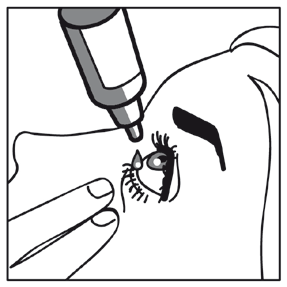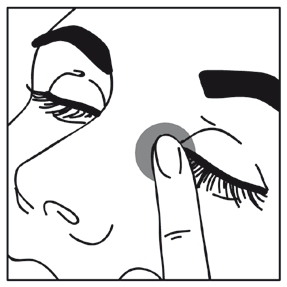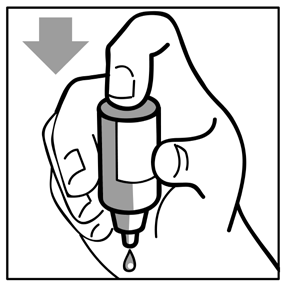
Brinzolamide Genoptim
Ask a doctor about a prescription for Brinzolamide Genoptim

How to use Brinzolamide Genoptim
Package Leaflet: Information for the Patient
Brinzolamide Genoptim, 10 mg/mL, Eye Drops, Suspension
Brinzolamidum
Read the package leaflet carefully before using the medicine, as it contains important information for the patient.
- Keep this leaflet, you may need to read it again.
- If you have any further questions, ask your doctor or pharmacist.
- This medicine has been prescribed for you only. Do not pass it on to others. It may harm them, even if their symptoms are the same as yours.
- If you experience any side effects, including any not listed in this leaflet, please tell your doctor or pharmacist. See section 4.
Table of Contents of the Leaflet
- 1. What is Brinzolamide Genoptim and what is it used for
- 2. Important information before using Brinzolamide Genoptim
- 3. How to use Brinzolamide Genoptim
- 4. Possible side effects
- 5. How to store Brinzolamide Genoptim
- 6. Contents of the pack and other information
1. What is Brinzolamide Genoptim and what is it used for
Brinzolamide Genoptim contains brinzolamide, which belongs to a group of medicines called carbonic anhydrase inhibitors. The medicine reduces pressure in the eye.
Brinzolamide Genoptim is used to treat high pressure in the eye. Increased pressure can lead to a disease called glaucoma.
If the pressure in the eye is too high, it can lead to vision loss.
2. Important information before using Brinzolamide Genoptim
When not to use Brinzolamide Genoptim:
- if you have severe kidney disease;
- if you are allergic to brinzolamide or any of the other ingredients of this medicine (listed in section 6);
- if you are allergic to sulphonamide medicines. Examples of sulphonamides include medicines used to treat diabetes and infections, as well as diuretics. Brinzolamide Genoptim may cause the same allergic reaction;
- if you have excessive acidification of the blood (a condition called hyperchloremic acidosis).
If you have any questions, consult your doctor.
Warnings and precautions
Before starting treatment with Brinzolamide Genoptim, discuss it with your doctor or pharmacist:
- if you have kidney or liver function disorders,
- if you have dry eye or corneal diseases,
- if you are using other sulphonamide medicines.
- if you have a certain type of glaucoma, in which the pressure inside the eye increases due to blockage of the outflow of fluid by deposits (pseudoexfoliative and pigmentary glaucoma)
or a certain type of glaucoma, in which the pressure inside the eye increases (sometimes suddenly), because the eye becomes deformed forward, thereby blocking the outflow of fluid (narrow-angle glaucoma),
- if you have ever had a severe skin rash or skin peeling, blistering, and (or) ulcers in the mouth after using brinzolamide or other related medicines.
Be careful when using brinzolamide:
In connection with brinzolamide treatment, severe skin reactions have been reported, including Stevens-Johnson syndrome and toxic epidermal necrolysis. You should stop using brinzolamide and seek medical attention immediately if you notice any symptoms related to these severe skin reactions described in section 4.
Children and adolescents
Brinzolamide Genoptim should not be used in infants, children, and adolescents under 18 years of age, unless prescribed by a doctor.
Brinzolamide Genoptim and other medicines
Tell your doctor or pharmacist about all the medicines you are taking, or have recently taken, and about the medicines you plan to take.
If you are using another carbonic anhydrase inhibitor (acetazolamide or dorzolamide, see section 1. What is Brinzolamide Genoptim and what is it used for), tell your doctor.
- 1. What is Brinzolamide Genoptim and what is it used for)
Pregnancy and breastfeeding
If you are pregnant or breastfeeding, think you may be pregnant, or plan to have a child, consult your doctor or pharmacist before using this medicine.
Women who may become pregnant are advised to use effective contraception during treatment with Brinzolamide Genoptim.
Brinzolamide Genoptim should not be used during pregnancy or breastfeeding. Do not use Brinzolamide Genoptim unless clearly prescribed by your doctor.
Before using any medicine, consult your doctor or pharmacist.
Driving and using machines
Do not drive or operate machinery until your vision returns to normal. For some time after instillation of Brinzolamide Genoptim, vision may be blurred.
Brinzolamide Genoptim may decrease the ability to perform tasks that require increased attention and (or) motor coordination. Be careful when driving or operating machinery.
Brinzolamide Genoptim contains benzalkonium chloride
The medicine contains approximately 3.1 μg of benzalkonium chloride in each drop (= 1 dose), which corresponds to 0.1 mg/mL.
Benzalkonium chloride may be absorbed by soft contact lenses and change their color. Remove contact lenses before instillation and wait at least 15 minutes before reinserting. Benzalkonium chloride can also cause eye irritation, especially in people with dry eye syndrome or corneal disorders (the transparent layer in front of the eye). If you experience any abnormal sensations in the eye, stinging, or pain in the eye after using the medicine, consult your doctor.
3. How to use Brinzolamide Genoptim
This medicine should always be used exactly as prescribed by your doctor or pharmacist. If you are unsure, consult your doctor or pharmacist.
Brinzolamide Genoptim is for ocular use only. Do not swallow or inject it.
The recommended dose is one drop into the affected eye (or eyes) twice a day - in the morning and in the evening.
Use the dose prescribed by your doctor. Brinzolamide Genoptim, 10 mg/ml, eye drops, suspension can be used in both eyes only if prescribed by your doctor. Use the medicine for as long as your doctor tells you to.
Method of administration:



1
2
3
- Prepare the bottle with Brinzolamide Genoptim and a mirror.
- Wash your hands.
- Shake the bottle and unscrew the cap. If the seal is loose after removing the cap, remove it before using the medicine.
- Invert the bottle, holding it between your thumb and middle finger.
- Tilt your head back. With a clean finger, pull down the lower eyelid to create a "pocket" between the eye and the eyelid. The drop should fall into this pocket (picture 1).
- Bring the tip of the bottle close to the eye. You can use a mirror to help you.
- Do not touch the dropper to the eye, eyelid, or surrounding areas, as this may cause infection.
- Gently squeeze the bottom of the bottle to release one drop.
- Do not squeeze the bottle: it is designed to release a drop with a gentle squeeze. (picture 2).
- After instillation of Brinzolamide Genoptim, press the corner of your eye next to your nose (picture 3) for at least 1 minute. This will help prevent the medicine from entering the rest of your body.
- 3) through at least 1 minute. This will help prevent the medicine from entering the rest of your body.
- If you are using drops in both eyes, repeat the above steps for the other eye.
- Tightly close the bottle immediately after use.
- Open a new bottle only after the previous one has been completely used up.
If the drop does not get into the eye, try again.
If you are using other eye drops, wait at least 5 minutes between instillation of Brinzolamide Genoptim, 10 mg/ml, eye drops, suspension, and the use of other drops. Apply eye ointments last.
Using more than the recommended dose of Brinzolamide Genoptim
If you have instilled too much medicine, rinse your eye with warm water. Do not reapply the medicine until the next dose is due.
Missing a dose of Brinzolamide Genoptim
If you miss a dose, instill one drop as soon as you remember, and then continue with your regular dosing schedule. Do not use a double dose to make up for a missed dose.
Stopping treatment with Brinzolamide Genoptim
If you stop using Brinzolamide Genoptim without consulting your doctor, the pressure in your eye will no longer be controlled, which can lead to vision loss.
If you have any further questions about using this medicine, ask your doctor or pharmacist.
4. Possible side effects
Like all medicines, this medicine can cause side effects, although not everybody gets them.
The following side effects have been observed during treatment with brinzolamide.
Stop using brinzolamide and seek medical attention immediately if you notice any of the following symptoms:
- red, flat patches on the body, often with blisters in the center, peeling of the skin, ulcers in the mouth, throat, nose, genitals, and eyes. These severe skin rashes may be preceded by fever and flu-like symptoms (Stevens-Johnson syndrome, toxic epidermal necrolysis).
Common side effects (may affect up to 1 in 10 people)
Eyes:
blurred vision, eye irritation, eye pain, discharge from the eye, itching of the eye, dryness of the eye, abnormal sensations in the eye, redness of the eye.
General:
unpleasant taste.
Uncommon side effects (may affect up to 1 in 100 people)
Eyes:
increased sensitivity to light, inflammation or inflammation of the conjunctiva, swelling of the eye, itching of the eyelids, redness or swelling, deposits in the eye, dazzling effect of light, burning sensation, growth on the surface of the eye, increased pigmentation of the eye, eye fatigue, formation of crusts on the eyelids, increased tear production.
General:
slow or weakened heart function, rapid or irregular heartbeat, slow heart rate, difficulty breathing, shortness of breath, cough, decreased red blood cell count, increased chloride levels in the blood, dizziness, memory problems, depression, nervousness, decreased emotional involvement, nightmares, general weakness, fatigue, abnormal feeling, pain, movement problems, decreased sex drive, decreased sexual potency in men, cold symptoms, nasal congestion, throat irritation, sore throat, abnormal sensation in the mouth, inflammation of the esophagus, stomach pain, nausea, vomiting, indigestion, frequent bowel movements, diarrhea, gas in the intestines, digestive disorders, kidney pain, muscle pain, muscle cramps, back pain, nosebleeds, runny nose, stuffy nose, sneezing, rash, abnormal skin sensations, itching, smooth rash on the skin or red, raised bumps, skin tension, headache, dry mouth, deposits in the eye.
Rare side effects (may affect up to 1 in 1,000 people)
Eyes:
corneal edema, double vision or limited vision, abnormal vision, flashes of light in the field of vision, decreased sensation in the eye, swelling around the eye, increased pressure in the eye, optic nerve damage.
General:
memory disorders, drowsiness, chest pain, nasal congestion, nasal dryness, ringing in the ears, hair loss, generalized itching, feeling of trembling, irritability, irregular heartbeat, weakness, difficulty sleeping, wheezing, itchy skin rash.
Frequency not known (cannot be estimated from the available data)
Eyes:
eyelid abnormalities, vision disorders, corneal disease, eye allergy, decreased eyelash growth or number, eyelid redness.
General:
exacerbated allergic symptoms, decreased sensation, tremors, decreased or lost taste, decreased blood pressure, increased blood pressure, increased heart rate, joint pain, asthma, limb pain, skin redness or inflammation, itching, abnormal liver function test results, swelling of limbs, frequent urination, decreased appetite, malaise, red, flat patches on the body, often with blisters in the center, peeling of the skin, ulcers in the mouth, throat, nose, genitals, and eyes, which may be preceded by fever and flu-like symptoms (Stevens-Johnson syndrome, toxic epidermal necrolysis).
Reporting side effects
If you experience any side effects, including any not listed in this leaflet, please tell your doctor or pharmacist, or nurse.
Side effects can be reported directly to the Department of Post-Marketing Surveillance of Medicinal Products, Medical Devices, and Biocides of the Office for Registration of Medicinal Products, Medical Devices, and Biocides: Al. Jerozolimskie 181C, 02-222 Warsaw, tel.: +48 22 49 21 301, fax: +48 22 49 21 309, website: https://smz.ezdrowie.gov.pl.
Side effects can also be reported to the marketing authorization holder.
By reporting side effects, you can help provide more information on the safety of this medicine.
5. How to store Brinzolamide Genoptim
Keep the medicine out of the sight and reach of children.
Do not use this medicine after the expiry date stated on the bottle and carton after "EXP". The expiry date refers to the last day of the month.
There are no special precautions for storage.
The bottle should be discarded after four weeks from the first opening to prevent infections.
Write the date of opening of each bottle in the space provided below and on the label of the bottle and carton. For packaging containing one bottle, enter only one date.
Date of opening (1):
Date of opening (2):
Date of opening (3):
Date of opening (4):
Date of opening (5):
Date of opening (6):
Medicines should not be disposed of via wastewater or household waste. Ask your pharmacist how to dispose of medicines that are no longer needed. This will help protect the environment.
6. Contents of the pack and other information
What Brinzolamide Genoptim contains
- The active substance is brinzolamide. Each milliliter of suspension contains 10 mg of brinzolamide.
- The other ingredients are: benzalkonium chloride, solution, carbomer 974P, disodium edetate, mannitol, water for injections, sodium chloride, poloxamer 407, sodium hydroxide 5N.
What Brinzolamide Genoptim looks like and contents of the pack
Brinzolamide Genoptim is a milky liquid (suspension), available in cartons containing 1, 3, or 6 plastic bottles with a dropper (type "droptainer") and a cap, containing 5 mL of white homogeneous suspension.
The following pack sizes are available: cardboard boxes containing 1, 3, or 6 bottles of 5 mL.
Not all pack sizes may be marketed.
Marketing authorization holder
Synoptis Pharma Sp. z o.o.
ul. Krakowiaków 65
02-255 Warsaw
Manufacturer
Pharmathen S.A.
6 Dervenakion
153 51, Pallini Attiki
Greece
Famar S.A.
63 Agiou Dimitriou Street
174 56 Alimos, Athens
Greece
Balkanpharma-Razgrad AD
68 Aprilsko vastanie Blvd.
7200 Razgrad
Bulgaria
Heumann Pharma GmbH & Co. Generica KG
Südwestpark 50
90449 Nürnberg
Germany
This medicinal product is authorized in the Member States of the European Economic Area under the following names:
Netherlands
Brinzolamide Pharmathen 10 mg/ml oogdruppels, suspensie
Germany
Brinzolamid Heumann 10 mg/ml Augentropfensuspension
Poland
Brinzolamide Genoptim
Lithuania
Brinzolamide ELVIM 10 mg/ml akių lašai (suspensija)
Latvia
Brinzolamide ELVIM 10 mg/ml acu pilieni, suspensija
Estonia
Brinzolamide ELVIM
France
Brinzolamide BIOGARAN 10 mg/ml, collyre en suspension
Italy
BRINZAFLUX
United Kingdom
Brinzolamide 10 mg/ml eye drops, suspension
Greece
Optonium
Czech Republic
Brinzolamid Apotex 10mg/ml oční kapky, suspenze
Date of last revision of the leaflet: July 2022
- Country of registration
- Active substance
- Prescription requiredYes
- Manufacturer
- ImporterBalkanpharma-Razgrad AD Famar S.A., Plant A Heumann Pharma GmbH & Co. Generica KG Pharmaten S.A.
- This information is for reference only and does not constitute medical advice. Always consult a licensed doctor before taking any medication. Oladoctor is not responsible for medical decisions based on this content.
- Alternatives to Brinzolamide GenoptimDosage form: Drops, 10 mg/mlActive substance: brinzolamideManufacturer: Lusomedicamenta Sociedade Tecnica Farmaceutica, S.A.Prescription not requiredDosage form: Drops, 10 mg/mlActive substance: brinzolamideManufacturer: Lusomedicamenta Sociedade Tecnica Farmaceutica, S.A. Zakłady Farmaceutyczne POLPHARMA S.A.Prescription requiredDosage form: Tablets, 250 mgActive substance: acetazolamide
Alternatives to Brinzolamide Genoptim in other countries
The best alternatives with the same active ingredient and therapeutic effect.
Alternative to Brinzolamide Genoptim in Ukraine
Alternative to Brinzolamide Genoptim in Spain
Online doctors for Brinzolamide Genoptim
Discuss dosage, side effects, interactions, contraindications, and prescription renewal for Brinzolamide Genoptim – subject to medical assessment and local rules.














